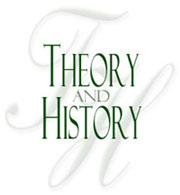|
Selon Murray N. Rothbard qui signait la préface de cette édition
de 1985, « Mises' fourth and last great work, Theory
and History (1957), has made remarkably little impact, and has rarely
been cited even by the young economists of the recent Austrian revival.
It remains by far the most neglected masterwork of Mises. And yet it provides
the philosophical backstop and elaboration of the philosophy underlying
Human Action. It is Mises' great methodological work, explaining
the basis of his approach to economics, and providing scintillating critiques
of such fallacious alternatives as historicism, scientism, and Marxian
dialectical materialism. » |

|
UN
SITE À DÉCOUVRIR
Le site Free-Market.net
est le portail le plus important et le plus complet sur internet dédié
à la défense de la liberté individuelle. On y trouve
une quantité infinie d'information sur les divers aspects de la
pensée et du mouvement libertariens, entre autres un annuaire extrêmement
utile de tous les sites web, organisations et publications libertariens
(incluant bien sûr le QL), des textes et d'autres ressources
sur de nombreux sujets pertinents, un service de nouvelles quotidiennes,
une section d'offres d'emplois, et cetera.

LET'S
BREAK UP THE CITY OF MONTREAL
Le commentaire suivant du directeur du QL a
été publié dans le Courrier des lecteurs du quotidien
montréalais The Gazette le 14 février dernier, en
réaction à une chronique de Henry Aubin sur le projet «
une île, une ville » du maire de Montréal
Pierre Bourque:
I entirely agree with Henry Aubin and others he quotes (cf. Feb. 9 column)
that Montreal should be broken up into smaller pieces intead of being merged
with the suburbs.
He writes that there is no ivory-tower theorizing in this small-is-beautiful
conclusion, which is to be expected since our ivory-tower scribblers are
paid by governments and almost invariably support big-government solutions
to everything. However, there is a perfectly good theoretical underpinning
to this point of view: it is libertarianism, the philosophy based on individual
freedom, the free market and – especially relevant in this case – the idea
that any government should be as small, limited, and as close to the people
as possible.
I suppose there is some confusion over this point of view because the Harris
government in Ontario has forced the merger of Toronto and now Ottawa.
But though the Harris Conservatives sometimes say nice things about the
free market and have indeed reduced the level of taxation, they are more
like authoritarian statists than libertarians. The provincial government's
size has not been cut in any significant way and bossing everybody around
seems to be their favorite method of governing. Here in Quebec, people
who admire Harris and his type of management (i.e. Mario Dumont), also
support a forced merger in Montreal and dismiss any suggestion that this
negates local democracy.
Libertarians have a totally different perspective. They think big government,
at any level, only breeds big bureaucracy, big spending, big taxes, big
waste and red tape, and results in an administration that inevitably looses
touch with what citizens really want.
The problem in Montreal is not fiscal inequity, or competition between
municipalities, or the fact that we don't « all speak
with one voice » to the outside world; the problem is
the inefficient size of the City of Montreal. Let's break it up into smaller,
more efficient, more locally responsible pieces instead of creating another
bureaucratic mastodon. Our megalomaniac politicians will then certainly
lose power and prestige, but it is ordinary citizens in the whole region
who will benefit.
Martin
Masse
Montreal
|




